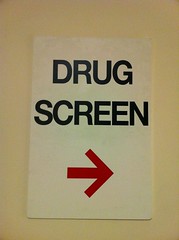 Drug testing can be a useful tool for employers. However, if done improperly, drug screening can stir up a maelstrom of legal fees and public relations setbacks. Despite these risks, employee drug testing is standard in many companies because it helps prevent the wide range of problems – diminished productivity, increased compensation spending, tardiness and absenteeism – posed by workers who are under the influence of drugs.
Drug testing can be a useful tool for employers. However, if done improperly, drug screening can stir up a maelstrom of legal fees and public relations setbacks. Despite these risks, employee drug testing is standard in many companies because it helps prevent the wide range of problems – diminished productivity, increased compensation spending, tardiness and absenteeism – posed by workers who are under the influence of drugs.
While these reasons are more than enough motivation for companies, the state has an overriding interest: To protect the welfare of workers, customers and the public at large. As we’ll see, employers who keep this latter priority in mind when designing and carrying out employee drug testing are typically immune to lawsuits brought by workers who feel their privacy has been violated.
Below, we provide tips on the best way to carry out drug screening while also protecting your company’s equity and reputation against lawsuits.
1. Begin with clear expectations.
If you plan to do drug testing, you need to make your intentions and processes clear to employees both before they are hired and during their employment. The first place to mention drug screening is in your employee handbook. Carefully outline your drug testing policy and explain how testing will be conducted. Many employees find that this discussion fits well into their description of disciplinary actions. Explain when, how and why employee drug testing will be done.
To further protect yourself against potential future lawsuits, create a separate document for each employee to read and sign as part of your new hire paperwork. This document should include a description of your drug testing policy. It should also describe the mental state required for each position, which will help you determine whether drug testing is necessary should you suspect an employee of using drugs.
Not all jobs require the same level of mental awareness. For instance, someone who must drive a vehicle as part of his work poses a much larger threat to society if he is drunk on the job than does an office worker who may return from lunch a bit tipsy. Carefully considering the mental and physical requirements of each position, and having each worker acknowledge these conditions, will create strong standing for your company in court should a lawsuit arise.
Of course, to be completely sure that your drug screening documentation is up to snuff, you should have it approved by your lawyer, who should have the background to assess your documents according to national and local labor laws.
2. Be aware of the legal standards for each substance.
Your lawyer can also clue you in to the legal precedence for on-the-job drug use in your state. Each substance has its own unique legal requirements:
Alcohol. Your employee handbook should include clear language banning alcohol use while on the job. That way, you can simply follow your internal disciplinary actions when an employee is clearly under the influence of alcohol. Again, in your disciplinary response you should consider the duties of each position. Should off-site alcohol use impair an employee’s performance, you will need to be a bit more cautious in your response. The American Disabilities Act protects workers from being fired solely for alcoholism, but you can discipline or fire a worker if you can show that he or she cannot meet performance standards (whether or not it’s as a result of off-site alcohol use).
Over-the-counter drugs. Ask your lawyer for advice in this area, as federal and state laws vary.
Illegal drugs. No legal protection is extended for those who use illegal drugs on the job, so you should follow your own disciplinary discretion.
In general, remember that you can be forced to pay legal awards if an employee convinces a jury that your drug testing violated their privacy rights or employee drug screening laws.
3. Test only high-risk workers.
Don’t test every employee, and don’t test randomly. These approaches may cast too wide a net, so they are less likely to withstand legal prodding. You will have a strong standing in court if you test only those who hold risky positions that could threaten fellow employees, customers or the public at large if carried out while on drugs. For instance, you would be legally justified in drug testing a gun-carrying security guard whom you suspect of showing up drunk. You must have reasonable suspicion to test that employee, and you must be primarily motivated by concern for the safety of others.
4. Follow legally kosher drug testing procedures.
Beyond privacy concerns, your drug screening actions could come under legal scrutiny if you don’t follow employee drug testing laws. Be sure you use a drug testing laboratory that’s approved by the U.S. Department of Health and Human Services or an equivalent state-level organization. Respect the privacy and dignity of the worker in your drug testing procedures. Never share employee drug testing results – keep them confidential. Always document why drug screening was necessary and how it was done. Finally, be consistent in your response to positive test results.
One final legal tip: You cannot force an employee to undergo drug testing, but you can fire him or her for not submitting to a test as long as you have a concrete reason for asking in the first place – i.e., you smelled alcohol on their breath, you and fellow employees noticed decreased performance or the employee has undergone drug treatment in the past.
[ Photo by: Francis Storr, on Flickr, via CC License ]